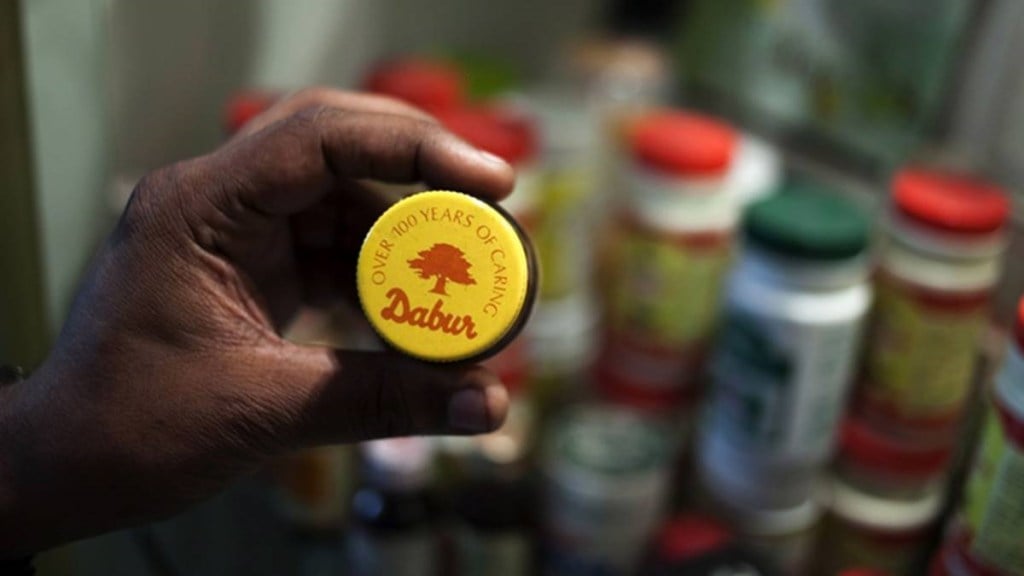FMCG major Dabur India on Wednesday said it will acquire a 51% stake in Badshah Masala Private Limited, the owners of the Badshah Masala brand which is engaged in the business of manufacturing, marketing and export of ground spices, blended spices and seasonings.
Announcing that it has signed definitive transaction agreements, Dabur said the acquisition is in line with its strategic intent to expand its foods business to Rs 500 crore in three years and into new adjacent categories. As part of the agreement, Dabur will acquire the balance 49% shareholding after five years.
Also read: CAG plans annual fiscal sustainability reports for states
“Dabur is acquiring 51% stake in Badshah for Rs 587.52 crore, less proportionate debt as on the closing date, with the Badshah enterprise being valued at Rs 1,152 crore,” the company said in a statement. This translates to a revenue multiple of around 4.5x and Ebitda (earnings before interest, tax, depreciation and amortisation) multiple of around 19.6x of financial 2022-23 estimated financials.
The transaction is expected to be cash EPS neutral in the first year and accretive thereafter. The acquisition also marks Dabur’s entry into the over Rs 25,000-crore branded spices and seasoning market in India.
“This acquisition will accelerate our growth strategy as we continue to build our foods business. We intend to leverage our international market presence to grow this business globally,” Mohit Burman, chairman, Dabur India, said.
According to Malhotra, the branded spices market in India is growing at healthy double digits, led by increasing consumption, upgrade from unbranded to branded, and growing preference for regional flavours across states. “The market is dominated by regional players and holds significant potential for growth in the future. The Badshah portfolio will gain from Dabur’s extensive distribution reach. We look forward to unlocking further synergies and market opportunities to capture the full potential of Badshah Masala,” he said.
Hemant Jhaveri, managing director, Badshah Masala Private Limited, said the transaction will enable the company to accelerate its growth by adding its products to Dabur’s broad portfolio to meet the needs of consumers across geographies.
On Wednesday, Dabur India reported a near 3% decline in its consolidated net profit on a year-on-year basis to Rs 490 crore as high raw material inflation continued to impact profitability and amid a dip in rural demand. It remained in line with the Bloomberg consensus estimates. Consolidated revenue for the second quarter increased 6% y-o-y to Rs 2,986 crore. The revenue growth stood at 8.5% on a constant currency basis.
Also read: India-UK free trade talks to gather pace after a brief lull
The operating profit fell 3.2% y-o-y to Rs 601 crore, while the operating margins shrunk 190 basis points y-o-y to 20.1%, primarily due to raw material inflation and mix impact. Price increases of around 6% coupled with cost optimisation partially mitigated inflation.
“While the challenging economic environment continued to be a concern and impacted the purchasing power, we are seeing green shoots of recovery with the onset of festive season. The impact of inflationary pressures was more pronounced in the rural markets with demand growth in hinterland lagging urban markets for the first time in five quarters,” Malhotra said in an earnings statement.
However, the company is continuing its investments to expand its rural footprint as it is hopeful of a recovery in rural demand in the coming quarters and wants to ride that wave, he said. Dabur has added nearly 9,000 villages in Q2FY23 take its rural coverage to over 100,000 villages.
The company’s board declared an interim dividend of Rs 2.50 per share, aggregating to a total payout of Rs 442.94 crore.
Dabur’s food & beverages business reported a strong 30% growth. The home care business was up nearly 21%, while the toothpaste category, ended the quarter with an over 11% growth. The shampoo and post-wash business ended the quarter up 9%. Dabur’s ayurvedic OTC business also reported a growth of over 9% during the quarter. The company gained market shares across 95% of the product portfolio.
Dabur’s international business reported a 12.3% jump in constant currency terms, led by strong constant currency growth in Turkey at 86%, Nepal at 25% and Egypt at 23%.

